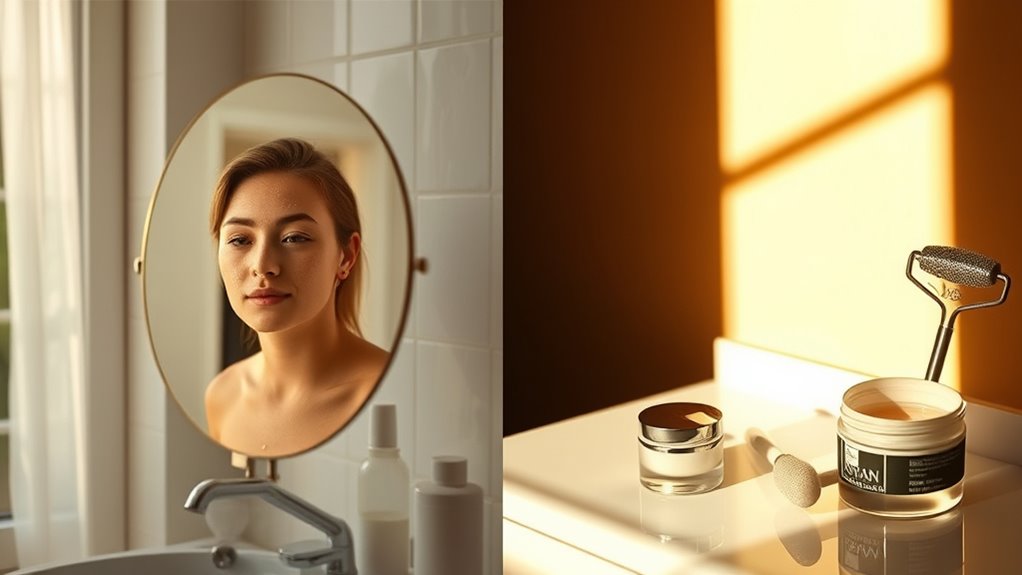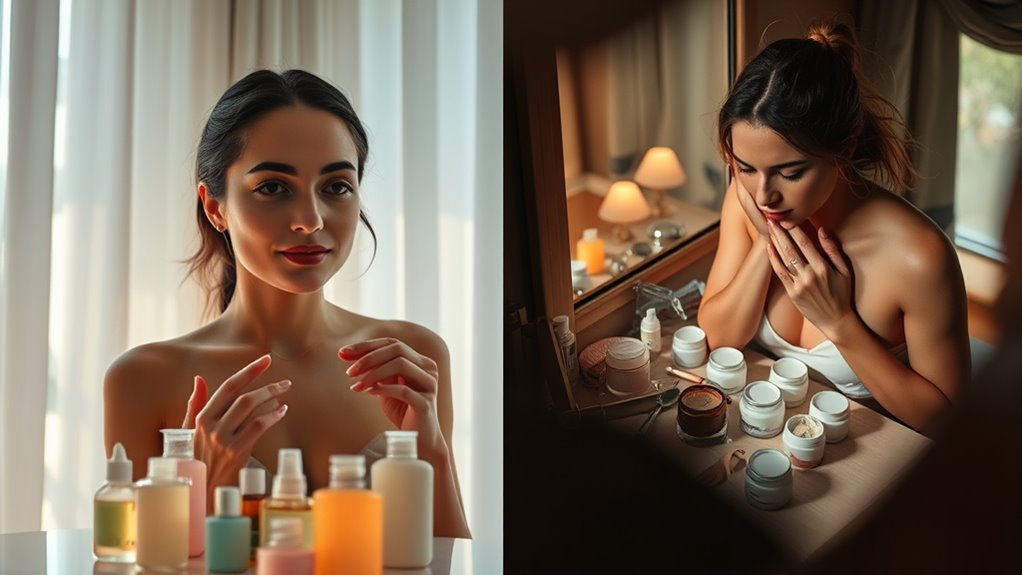Your skincare routine works best when you match products to your skin’s needs at different times. In the morning, your skin benefits from protection against sun, pollution, and bacteria, so use broad-spectrum sunscreen and antioxidants. At night, your skin focuses on repair, so apply nourishing ingredients like retinol and hyaluronic acid to boost regeneration. For ideal results, stick to your routine’s timing and discover more ways to enhance your skincare success.
Key Takeaways
- Morning routines protect skin from daily environmental stressors like UV rays and pollution.
- Night routines focus on repair, using ingredients like retinol and peptides to promote regeneration.
- Sunscreen application during the day prevents premature aging and enhances daytime skin defense.
- Nighttime treatments penetrate deeper, supporting skin’s natural renewal processes during sleep.
- Both routines are essential; morning for protection and prevention, night for repair and rejuvenation.

Your skin goes through different processes during the day and night, making it important to time your skincare routine accordingly. During the day, your skin faces environmental stressors like sun exposure, pollution, and bacteria. That’s why sun protection is essential in your morning routine. Applying broad-spectrum sunscreen helps shield your skin from harmful UV rays, preventing premature aging, sunburn, and skin cancer. It’s best to use a generous amount and reapply if you’re spending extended time outdoors. Additionally, during the day, your skin produces oils to protect itself, and environmental pollutants can clog pores. Using lightweight, antioxidant-rich products in the morning can give your skin a protective barrier, combating free radicals and reducing inflammation. This routine prepares your skin to face the day’s challenges, ensuring you look fresh and healthy.
At night, your skin enters a different phase—focused on repair and regeneration. While you sleep, your skin’s natural renewal processes accelerate, making nighttime the ideal time to apply nourishing treatments. Ingredients like retinol, peptides, and hyaluronic acid work best during this period, helping to boost collagen production, fade dark spots, and hydrate deeply. Nighttime repair is essential because your skin is less exposed to external aggressors, allowing these potent ingredients to penetrate more effectively. Skipping your evening routine means missing out on this important repair window, which can hinder your skin’s ability to recover from daily damage and maintain a youthful glow. Incorporating a rich moisturizer or targeted serums before bed ensures your skin stays hydrated and resilient. Using specialized skincare ingredients such as retinol and peptides during the night optimizes their efficacy, as your skin is more receptive to these treatments during the repair cycle. Remember, the benefits of your skincare products are maximized when used at the right time; daytime routines focus on protection, while nighttime routines emphasize repair.
Frequently Asked Questions
Can I Use the Same Products Morning and Night?
You can use the same products morning and night if they suit your skin type, but it’s better to contemplate product layering and your skin’s needs. Some products, like serums and moisturizers, work well both times, while others, like exfoliants, are better at night. Maintaining skincare consistency is key; use products as directed, and listen to your skin’s responses to avoid overloading or irritation.
How Does Skin Type Influence Routine Timing?
Did you know that 60% of people with sensitive skin notice better absorption of products at night? Your skin type influences your routine timing because sensitive skin may react to certain ingredients, making night routines gentler. If your skin is sensitive, apply nourishing products before bed when your skin’s barrier is more receptive. Tailoring your routine to your skin type ensures ideal absorption and minimizes irritation, giving you healthier, calmer skin.
Are There Specific Ingredients Best Suited for Morning Use?
You should prioritize ingredients that are compatible with morning use, like antioxidants and vitamin C, as they protect your skin from environmental damage. Look for formulations with stability in the morning to guarantee effectiveness throughout the day. Avoid heavy or irritating ingredients early, and opt for light, protective formulations that work well under makeup or sunscreen. This way, your routine stays effective and your skin stays protected all day long.
Does Climate Affect When to Apply Certain Skincare Products?
Climate definitely impacts when you should apply certain skincare products. Seasonal changes mean your skin reacts differently, so you might need richer moisturizers in winter and lighter formulas in summer. Indoor versus outdoor environments also matter; outdoor exposure can lead to more sun damage, so apply SPF during the day, while indoor settings might require more hydration or barrier protection. Adjust your routine based on these factors to keep your skin healthy year-round.
How Long Should I Wait Between Product Layers?
Ever wondered how long to wait between product layers? Proper product layering guarantees each product absorbs properly, maximizing benefits. Generally, you should wait 30 seconds to a minute for absorption timing before applying the next layer. This prevents pilling and allows ingredients to work effectively. Rushing through layering can diminish results, so take your time to let each product settle. Are you giving your skincare enough time to do its job?
Conclusion
So, the truth is, both morning and night routines matter—each time offers unique benefits. While your morning routine helps protect and prep your skin for the day, your night routine focuses on repair and renewal. Skipping either can mean missing out on ideal results. Science suggests that your skin’s natural cycle actually responds better to certain ingredients at specific times. Ultimately, consistency in both morning and night routines is key to truly seeing the benefits.









